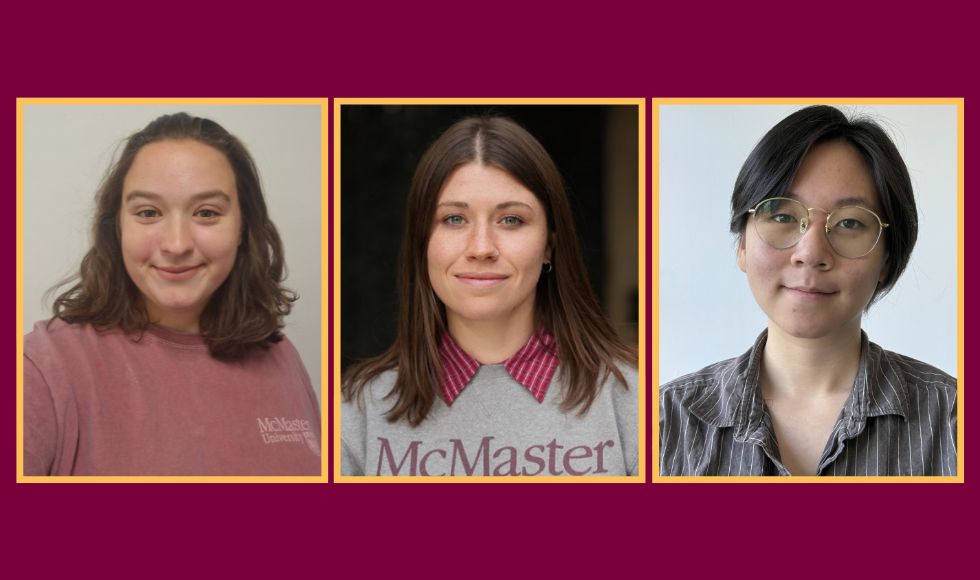Democracy in action: CIVDEM students explore Indigenous representation through experiential learning

Maia Rousseau, Abbey Forbes and Gloria Liu presented their research at an internationally renowned electoral integrity conference.
When Abbey Forbes, Gloria Liu and Maia Rousseau signed up for a course in civic democracy, they didn’t expect to find themselves presenting research at a national conference, interviewing a New Zealand councillor or working alongside a grassroots Indigenous organization.
But through an experiential CIVDEM course, that’s exactly what happened.
Now, the recent graduates are encouraging students across McMaster to get involved with real-world issues surrounding democracy, build valuable professional skills and get the opportunity to receive up to $1,500 for completing the research project and related experiential learning activities
Putting theory into practice
The course, CIVDEM 4ED6 – Partnered Research in Elections & Democracy, isn’t your typical class. At its heart is the opportunity to work with partner organizations to research an issue that they’re facing.
In this team’s case, it meant partnering with Circle of Beads, a grassroots Indigenous group who are advocating for more Indigenous representation on Hamilton City Council. Specifically, they’re looking for a dedicated seat on council to be held by an Indigenous councillor.
“Being able to work with Circle of Beads was phenomenal,” said Rousseau. “I’ve learned a lot about the Indigenous experience in Canada, but being able to actually work alongside the group was an amazing experience.”
The team examined how council debates around Indigenous representation take place. They looked at whether the debates lived up to the democratic ideals of deliberative and consensus-based decision making, and whether Truth and Reconciliation and Treaty Rights are being upheld.
As part of their research, they examined how New Zealand councils are grappling with Māori representation, leading the team to interview a councillor to help them compare the process with that in Canada.
The culmination of the work came on July 7, when the students presented their research at the Electoral Integrity Conference, organized by the Electoral Integrity Project and the Carter Center. The two organizations are both renowned for their work globally in support of democratic elections and strengthening participatory democracy, consistent with human rights.
They’ve now submitted a paper for publication, co-authored with the class instructor Karen Bird.
“The research starts to feel like your baby,” said Forbes. “It felt like it wasn’t just academic coursework anymore. Being able to work with a grassroots local organization made the research feel really meaningful.”
Developing a diverse skillset
By the end of the class, the students had developed a broad range of skills, both academic and professional.
“Working directly with a partner organization, outside of the classroom, really helped develop all of our skills: Academic skills, collaborative skills and also communication skills,” said Liu. She said she now felt prepared to enter the workforce, but hasn’t ruled out a return to academia down the line.
For Rousseau, who is training to be a paramedic, the skills she learned on the course will come in useful.
“I’ve been told on my course just how useful it will be for a career as a paramedic because I have a better understanding of the Indigenous experience and I’d be able to help patients more,” she said. “So I thought that was really cool.”
Forbes, who is staying at McMaster to pursue an MA with the School of Earth, Environment & Society, said the class made her discover her passion for research.
“I fell in love with research in my fourth year and definitely this course was a big part of that,” she said. “I found out that I like the creative aspect of research. So let me do it for two more years!”
Forbes had a simple message for students considering the course.
“You’ve got to take this class,” she said. “You just have to. It’s an amazing opportunity.”
Next class in the Winter Term
The next offering of CIVDEM 4ED6 is this Fall, and the deadline for applications is September 10.
Students will receive up to $1,500 of Co-operative Education and Work-Integrated Learning Canada funding for taking this course and completing a research project like this for a community organization.
In the upcoming class, the following Co-operative Education and Work-Integrated Learning (CEWIL) opportunities are planned:
- Hamilton Ward 8 By-election: Sept. 20-22
- Association of Municipalities of Ontario Healthy Democracies Forum (Toronto): Oct. 18 & 19
- Special Campus Event with Elections Ontario + Lunch/Networking: Oct. 28
- Samara Centre for Democracy (Toronto): Field trip hosted by Samara
- Partnered Research Project with partners including CIVIX Canada, Samara Centre for Democracy, Apathy is Boring, AMO Healthy Democracies Project, Circle of Beads, and Elections Canada
Level 4 students from any discipline may enrol in the course. However, due to CEWIL funding rules, only Canadian citizens and permanent residents are eligible for financial supports. Contact the Political Science Department for further details.


